Back in the day, like way back in Medieval times and even with those Ancient Greeks and Romans, they used chamomile to help with tummy troubles and sleep struggles.
And guess what?
Even today, it’s still a go-to for those sniffly noses and for when you just need to feel relaxed.
Now, here’s the cool part: making chamomile tea is a breeze.
Not only that, if you’re into growing stuff, chamomile is your new best bud.
You can totally plant it in your garden, even if it’s just a tiny one.
I did it, and trust me, I’m no gardening expert.
When you use those fresh, homegrown flowers, the store-bought tea won’t stand a chance.
So in this post, I’m gonna talk about how to make chamomile tea in different ways with some delicious food pairings, tea variations, and expert tips!
What Is Chamomile Tea?
Chamomile tea is a special kind of tea that isn’t like regular tea made from tea leaves.
It’s more of a herbal tea or tisane.
The tea doesn’t come from the usual tea plant called Camellia sinensis.
Instead, it’s made using the pretty flower heads of the chamomile plant.
You know, those flowers that smell really nice and have white petals with yellow centers?
There are two main types of chamomile used for tea: German Chamomile and Roman Chamomile.
These chamomile plants are tough little things and they grow all over the world.
They originally come from Europe and Asia, but now you can find them in North and South America too.
The cool thing is, you can actually grow chamomile at home in your herb garden without much trouble.
I’ve done it myself!
The flowers of chamomile can be used in different ways.
You can mix them with other fresh herbs, or even add them to spiced teas for some sweetness.
And don’t worry if you can’t grow them – you can usually find chamomile flowers at places like farmer’s markets and health food stores.
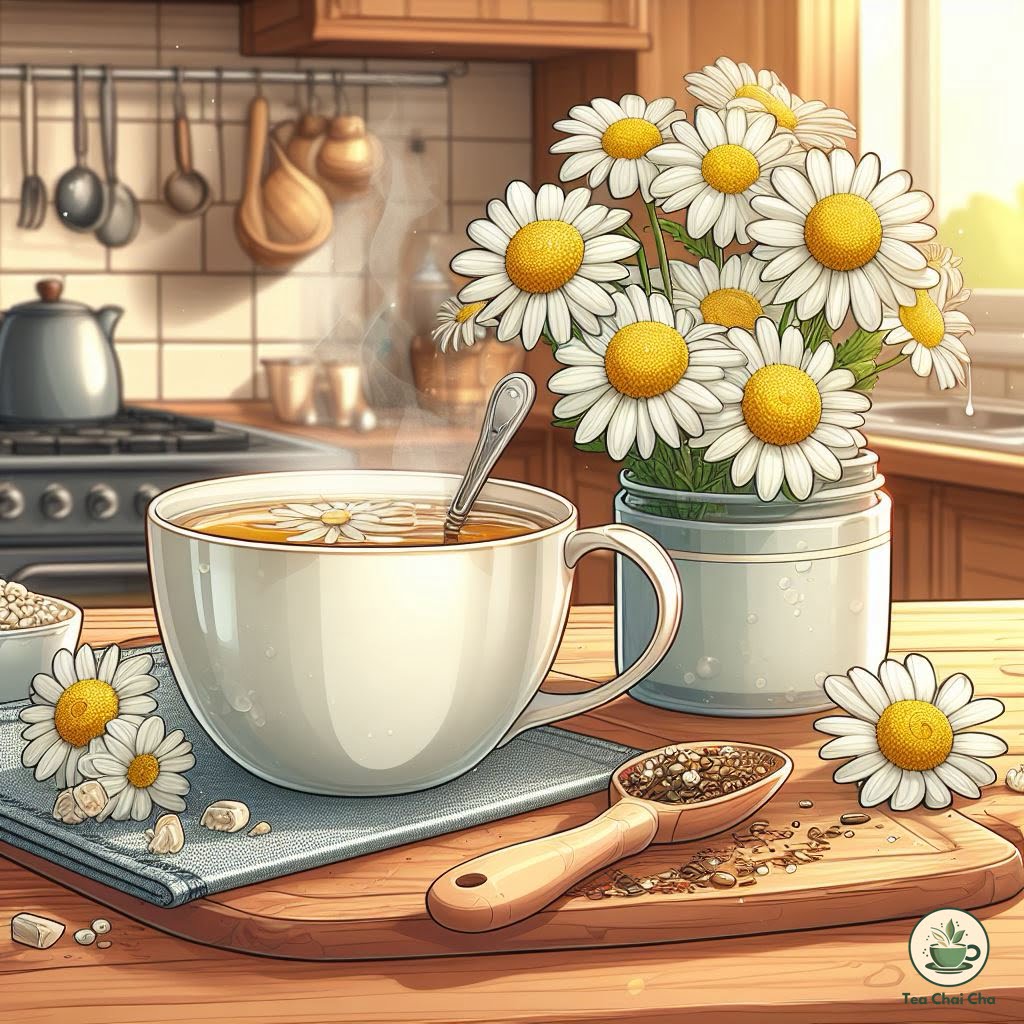
What You Need to Make Chamomile Tea
To make a great cup of chamomile tea, you’ll need a few basic things.
Here’s what you’ll need:
1. Chamomile Flowers
The star of the show, of course, is the chamomile flowers themselves.
You can choose between dried chamomile flowers or fresh ones if you’re growing them.
I prefer dried chamomile because it’s easy to store and use whenever I want a cup of tea.
2. Hot Water
You’ll need some hot water to brew your tea.
You can heat it up on the stove or use an electric kettle. It’s up to you.
3. A Cup or Mug
You’ll want a nice cup or mug to enjoy your tea.
Something that feels good in your hands is always a plus.
4. Optional Additions
Some people like to add a little honey or a slice of lemon to their chamomile tea for extra flavor.
That’s totally up to your taste buds.
I sometimes add a touch of honey when I want it a bit sweeter.
5. A Strainer or Infuser (Optional)
If you don’t want chamomile flower bits floating in your tea, you can use a strainer or an infuser.
It keeps things nice and clean.
Brewing Temperature and Steeping Time for Chamomile Tea
Here’s the right brewing temperature for chamomile tea:
| Chamomile Tea Type | Brewing Temperature | Steeping Time |
| Fresh/Dried Flowers | 200°F (93°C) | 5-7 minutes |
| Tea Bags | 212°F (100°C) | 3-5 minutes |

4 Different Ways to Make Chamomile Tea
When it comes to making chamomile tea, there are a few different methods you can choose from.
Each one offers a unique twist on the soothing and fragrant drink.
Let’s explore these options to find the one that suits you best.
1. How to Make Chamomile Tea with Fresh Flowers
If you’re lucky enough to have your own chamomile plants, making tea from fresh flowers is a wonderful option.
Here’s a simple guide to walk you through the process:
Step 1: Harvest the Flowers
When the chamomile flowers are in full bloom, usually during the warmer months, gently pluck the flower heads from the plant.
You want to collect a good handful of flowers, which will give you a nice, flavorful cup of tea.
Step 2: Rinse the Flowers
Give the flowers a gentle rinse under cool water to remove any dirt or bugs that might be hanging around.
Pat them dry with a clean cloth or paper towel.
Step 3: Prepare the Water
Heat up water in a kettle or on the stove until it’s hot with bubbles.
Water over 100°C can be too harsh for the delicate flavors of chamomile.
Step 4: Place the Flowers in a Cup
Put the fresh chamomile flowers directly into a cup or mug.
You can use a tea strainer or infuser if you want to keep the flower bits out of your tea.
Step 5: Pour the Hot Water
Carefully pour the hot water over the chamomile flowers in the cup.
You want to cover the flowers completely with water to let them steep and release their flavors.
Step 6: Steep and Enjoy
Let the flowers steep in the hot water for about 5-7 minutes.
This gives the tea enough time to develop its soothing taste.
You can adjust the steeping time depending on how strong you like your tea.
Step 7: Remove the Flowers
After steeping, remove the chamomile flowers from the cup.
You can use a spoon or simply lift out the strainer or infuser if you used one.
Step 8: Optional Additions
If you like your tea a bit sweeter, you can add a drizzle of honey or a slice of lemon.
I sometimes enjoy it just as it is – pure and calming.
Scroll to the bottom to have complete recipe with ingredients and instructions.
2. How to Make Chamomile Tea from Dried Flowers
Don’t worry if you don’t have access to fresh chamomile flowers; dried ones work just as well!
Here’s a simple guide to crafting a soothing cup of chamomile tea using dried flowers.
Step 1: Gather Your Supplies
First things first, make sure you have everything you need.
You’ll need dried chamomile flowers, hot water, a cup or mug, and optionally a strainer or infuser.
I usually use about 1 to 2 teaspoons of dried chamomile flowers for one cup of tea, but you can adjust that based on how strong you like it.
Step 2: Boil Water
Heat water until it’s just about to boil.
You don’t want the water to be too hot, as that can make the tea taste bitter.
I’ve found that around 200-212°F (93-100°C) is a good temperature for chamomile tea.
Step 3: Add Chamomile Flowers
Place your dried chamomile flowers into your cup or mug.
If you’re using an infuser, put the flowers in there to make things easier.
Step 4: Pour Hot Water
Pour the hot water over the chamomile flowers.
Make sure they’re fully submerged.
I usually fill my cup about halfway with water.
Step 5: Steep Time
Let the chamomile flowers steep in the hot water for about 5 to 10 minutes.
I find that 5 minutes is enough for a mild flavor, while 10 minutes gives a stronger taste.
It’s all about your preference.
Step 6: Optional Additions
If you like, you can add a teaspoon of honey or a slice of lemon to your tea for extra flavor.
I sometimes enjoy it plain too.
Step 7: Strain and Enjoy
If you used loose chamomile flowers, you might want to strain the tea before drinking to avoid bits in your cup.
If you used an infuser, simply remove it.
Now, sit back, relax, and enjoy your homemade chamomile tea!

3. How to Make Chamomile Tea with Milk
If you’re looking to try something a little different, making chamomile tea with milk can add a lovely creamy twist to your tea experience.
Here’s how you can do it step by step:
Step 1: Heat Milk
Start by heating up the milk.
You can use any kind of milk you like – regular cow’s milk, almond milk, soy milk, you name it.
Pour the milk into a small saucepan and gently heat it on the stove.
Step 2: Measure Chamomile Flowers
While the milk is heating, get your chamomile flowers ready.
You’ll need about 1-2 teaspoons of dried chamomile flowers for each cup of tea.
If you’re using fresh chamomile, a small handful of flower heads should do the trick.
Step 3: Pour Milk in Teapot
Once the milk is warm, add the chamomile flowers to a teapot.
Pour the warm milk over the flowers.
This is where the magic happens – the chamomile flavor infuses into the milk, creating a soothing blend.
Step 4: Steep Chamomile Flowers in Milk
Put the lid on the teapot and let the chamomile and milk mixture steep for about 5-7 minutes.
This gives the flavors time to mingle.
Step 5: Warm Up Your Mug
While the tea is steeping, you can prepare your cup.
Get your favorite mug ready.
You can preheat it as well by swirling warm or boiling water in it.
Step 6: Strains and Serve
After the steeping time is up, carefully pour the chamomile-infused milk into your cup.
You might want to use a strainer to catch any leftover chamomile bits.
Step 7: Sweeten It
If you like your tea a bit sweet, this is the time to add a touch of honey.
Stir it in until it’s nicely mixed.
Step 8: Enjoy
Now you have your creamy chamomile tea with milk all ready to enjoy!
Now lets talk about making chamomile tea from tea bags.
But before that, here’s a gardening hack to grown chamomile from tea bags.
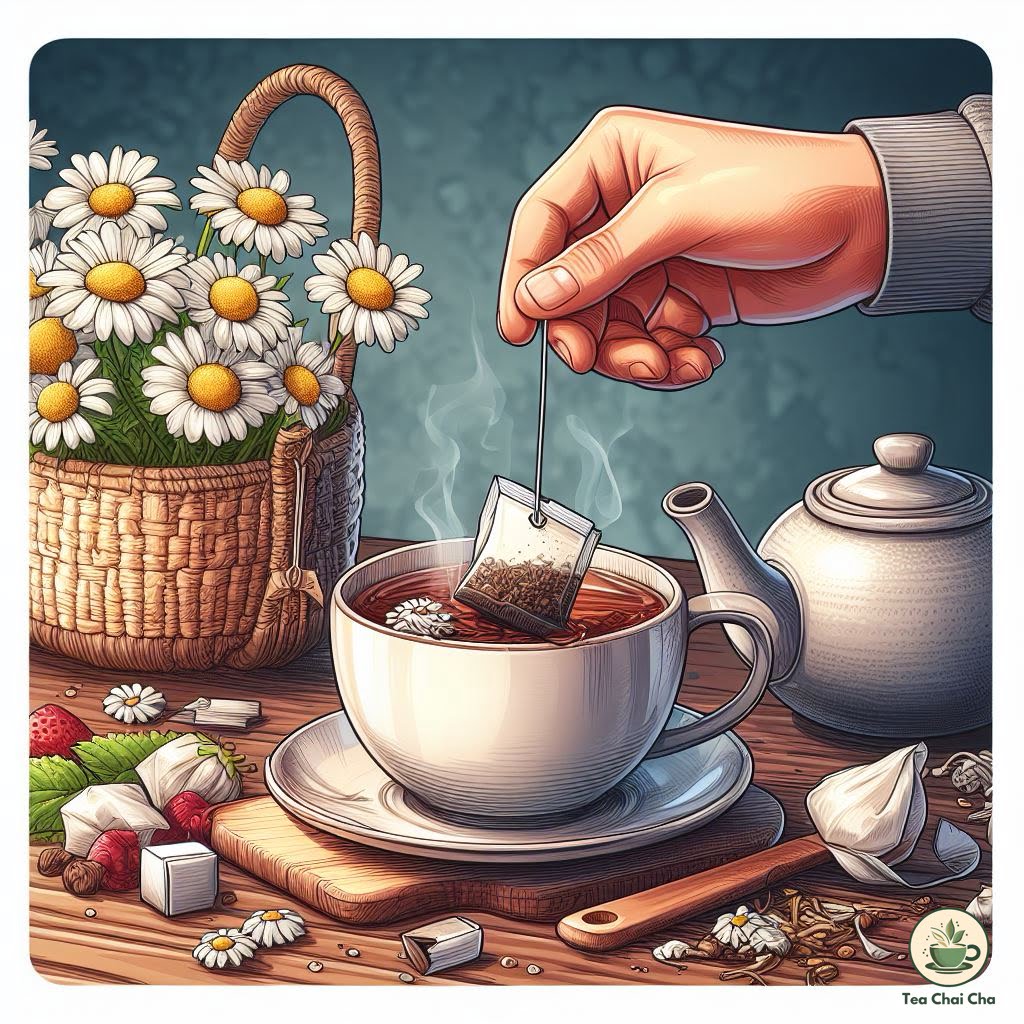
4. How to Make Chamomile Tea with Tea Bags
If you’re looking for a quick and convenient way to enjoy chamomile tea, using tea bags is a great option.
Here’s a simple step-by-step guide to help you make a delicious cup of chamomile tea using tea bags.
Step 1: Boil Water for Your Tea
Start by boiling some water.
I usually do this with a kettle on the stove or an electric kettle.
You want the water to be near to boiling when you pour it over the tea bag.
Step 2: Get a Chamomile Tea Bag
Grab a chamomile tea bag.
These are easy to find at stores or online.
The tea bag is a little pouch filled with dried chamomile flowers that will make your tea tasty.
Step 3: Place the Tea Bag in Your Cup
Put the chamomile tea bag gently into your cup or mug.
Make sure the cup can handle hot water without cracking.
Step 4: Pour in the Hot Water
Once the water has boiled, let it cool down for a moment.
Then, carefully pour the hot water into the cup over the tea bag.
Step 5: Allow the Tea to Steep
Now comes the steeping part.
This means letting the tea bag sit in the hot water to soak up all the chamomile goodness.
Give it about 5 minutes to steep properly.
Step 6: Remove the Tea Bag
After the 5 minutes are up, take out the tea bag.
You can gently press it against the side of the cup with a spoon to release any extra flavor.
Step 7: Enjoy Your Chamomile Tea
Your chamomile tea is now ready to enjoy!
If you like, you can add a little honey or a slice of lemon to make it even more delicious.
Bonus Tip: Using a Tea Pot
If you’re making tea for a group, you can use a tea pot instead of a cup.
Just place the tea bags in the pot, pour in the hot water, let it steep, and then pour the tea into cups when it’s ready.
How to Dry Chamomile for Tea
Drying chamomile flowers for tea is a great way to preserve their soothing qualities.
I’ve done this a few times and it’s pretty straightforward.
Here’s how you can dry chamomile for tea:
Step 1: Harvesting Chamomile Flowers
Start by picking the chamomile flowers when they are fully open.
You want to choose flowers that are healthy and free from any damage.
I usually do this in the morning when the dew has dried but before it gets too hot.
Step 2: Prepping the Flowers
Gently shake the flowers to remove any insects or dirt.
You can also give them a very light rinse if needed, but make sure they’re completely dry before moving on.
Step 3: Air Drying
There are a couple of ways you can air dry chamomile flowers.
You can tie small bunches of flowers together with a string and hang them upside down in a well-ventilated, dry area.
This is what I usually do.
Alternatively, you can spread the flowers out on a clean tray or a mesh screen to dry.
Keep them out of direct sunlight to retain their color and essential oils.
Step 4: Patience
Drying chamomile flowers takes time – usually about a week or two.
You’ll know they’re ready when the petals feel dry and crisp to the touch, and the flowers have a slightly sweet aroma.
Step 5: Storing
Once the flowers are fully dried, gently remove the petals from the stems.
You can store the dried petals in an airtight container, away from light and moisture.
Be sure to label the container with the date so you can keep track of freshness.
Step 6: Brewing Your Tea
When you’re ready for a cup of chamomile tea, simply take a small handful of the dried chamomile petals. And then follow the steps I mentioned earlier for making tea from dried flowers.

Chamomile Tea Hot or Cold
One thing you might be wondering when it comes to chamomile tea is whether to have it hot or cold.
Let me break down the difference in taste to help you choose what suits you best.
Hot Chamomile Tea
Having chamomile tea hot is a classic way to enjoy it.
When it’s warm, chamomile tea has a soothing and comforting quality.
It’s perfect for winding down in the evening or when you need something cozy.
The hot water really brings out the floral and slightly earthy notes of the chamomile flowers.
I often go for hot chamomile tea before bedtime.
Cold Chamomile Tea
On the other hand, cold chamomile tea is quite refreshing.
It has a milder flavor compared to the hot version.
When it’s chilled, chamomile tea takes on a gentle, subtle taste with a touch of sweetness.
It’s excellent on a hot day or as a refreshing alternative to sugary drinks.
I like to keep a pitcher of cold chamomile tea in the fridge during the summer.
Ultimately, it comes down to your preference and the occasion. Hot for cozy moments, cold for a refreshing sip.
I enjoy both depending on my mood and the weather. Give both a try and see which one you like best!

How to Make Chamomile Iced Tea
When the weather starts heating up, there’s nothing quite as refreshing as a glass of chilled chamomile iced tea.
Whether you’re looking for a quick iced tea fix or a more nuanced cold brew, there are a couple of methods to choose from.
Quick and Easy Chamomile Iced Tea
For those moments when you need your chilled tea pronto, this method is your go-to. Here’s how to whip up a batch:
Ingredients
- 4 chamomile tea bags
- 4 cups of water
- Sweetener of your choice (e.g., honey, sugar)
- Lemon slices (optional)
- Ice cubes
Instructions
- Boil 4 cups of water and pour it into a heat-resistant pitcher.
- Add the chamomile tea bags and let them steep for about 5-7 minutes.
- Remove the tea bags and sweeten the tea to taste while it’s still warm.
- Allow the tea to cool to room temperature before placing it in the refrigerator.
- Once the tea is cold, add ice cubes and lemon slices if desired.
- Serve and enjoy!
Cold Brew Chamomile Tea
If you’re looking for a more delicate flavor profile, chamomile cold brew is the way to go.
This method takes a bit more patience, but the result is worth it.
Ingredients
- 4 chamomile tea bags
- 4 cups of cold water
- Sweetener of your choice
- Lemon slices (optional)
- Ice cubes
Instructions
- In a pitcher, combine 4 chamomile tea bags and 4 cups of cold water.
- Cover the pitcher and let it steep in the refrigerator for at least 4-6 hours, or overnight for a stronger flavor.
- Once the steeping time is up, remove the tea bags and sweeten the cold brew to your liking.
- Give it a gentle stir and pour over ice cubes.
- Garnish with lemon slices if desired.
- Sip back and enjoy the smoothness of chamomile-infused cold brew.
Choosing Your Chill!
When you’re craving that instant gratification and don’t mind a slightly bolder flavor, the chamomile iced tea is a quick and delightful choice.
On the other hand, if you’re a fan of subtle undertones and have the patience to wait, the chamomile cold brew is bound to be your new summer companion.
7 Factors That Affect the Flavor of Chamomile Tea
As someone who appreciates a good cup of chamomile tea, I’ve found that paying attention to some factors can make a noticeable difference in the overall flavor and enjoyment of the tea.
Here’s what I’ve learned the hard way:
1. Tea Quality
The quality of the chamomile tea you choose is paramount.
Opt for loose-leaf chamomile tea from reputable sources whenever possible.
The flowers’ freshness and purity contribute significantly to the tea’s aroma and flavor.
Loose-leaf teas generally offer a more robust and authentic taste compared to tea bags.
2. Water Temperature
The temperature of the water you use for steeping is essential.
Chamomile tea is delicate, so avoid using boiling water.
Instead, let the water cool for a minute after boiling, around 200°F (93°C).
This gentler heat helps extract the tea’s flavors without scalding them.
3. Steeping Time
The duration you steep your chamomile tea affects its taste.
Generally, a steeping time of 5-7 minutes is ideal.
Longer steeping can make the tea bitter and overpower the natural floral notes.
Set a timer to ensure you get the perfect balance of flavors.
4. Proportions
The ratio of chamomile flowers to water matters.
Using about 1-2 teaspoons of loose-leaf chamomile flowers per cup of water is a good starting point.
Adjust this based on your preference for a stronger or milder flavor.
5. Freshness
Like many natural products, chamomile tea is best when fresh.
Over time, its flavor can fade.
It’s wise to store chamomile tea in an airtight container in a cool, dark place to preserve its quality and taste.
6. Additional Ingredients
Some enjoy adding a touch of honey, a slice of lemon, or a cinnamon stick to their chamomile tea.
These additions can complement and enhance the tea’s flavor profile, offering a unique and personalized taste experience.
7. Vessel Choice
Believe it or not, the vessel you use to steep and drink your chamomile tea can influence the flavor.
Opt for ceramic or glass teapots and cups.
These materials don’t impart unwanted flavors to the tea.
It allows you to enjoy the true taste of chamomile.
Experiment with these elements to find your perfect cup – whether you prefer a delicate floral note or a stronger, more robust flavor.
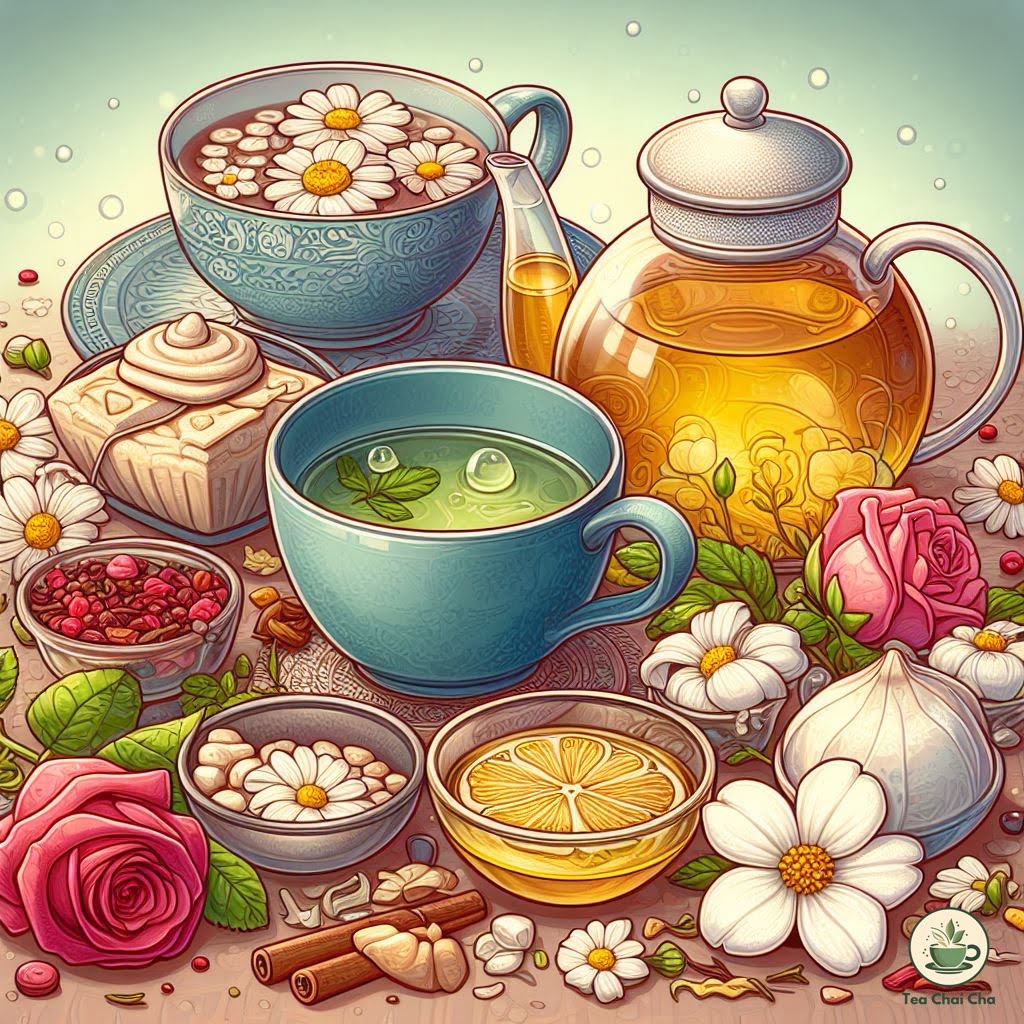
How to Make Chamomile Tea Taste Good
When it comes to making a cup of chamomile tea that’s not just good, but truly delightful, a few simple tweaks can make all the difference.
Honey and Lemon
One of my favorite ways to add a burst of flavor to chamomile tea is by adding a spoonful of honey and a squeeze of fresh lemon.
The natural sweetness of honey complements the earthy notes of tea.
And the zing of lemon brightens up the overall taste.
Just remember not to overdo it – a little goes a long way.
Vanilla Essence
A few drops of pure vanilla essence can transform your chamomile tea into a comforting, fragrant delight.
This addition adds a subtle hint of sweetness and depth to the tea’s profile.
Be sure to choose high-quality vanilla essence for the best results.
Cinnamon Stick
For those who enjoy a touch of warmth in their beverages – you can add a cinnamon stick to your chamomile tea.
The gentle spice of cinnamon complements the gentle floral notes of tea.
Thus, creating a well-rounded flavor experience.
Mint Leaves
Fresh mint leaves are another fantastic option to consider.
Mint leaves infuse your chamomile tea with a refreshing coolness.
This pairs exceptionally well with the calming properties of chamomile.
A few leaves are all you need to elevate your tea’s taste.
Steep with Purpose
The way you steep your chamomile tea can greatly impact its flavor.
To avoid bitterness, use water that’s just off the boil, around 200°F (93°C).
Steep the tea for about 5-7 minutes, and no longer, to extract the best flavors without making it bitter.
Experiment with Blends
Don’t be afraid to get creative and mix chamomile with other herbal teas or ingredients.
You can combine it with lavender, rose petals, or even a hint of ginger.
Sweeteners with Caution
If you prefer a sweeter cup, try adding a touch of maple syrup or agave nectar.
However, be mindful not to overpower the delicate chamomile flavor.
Start with a small amount and adjust to your liking.
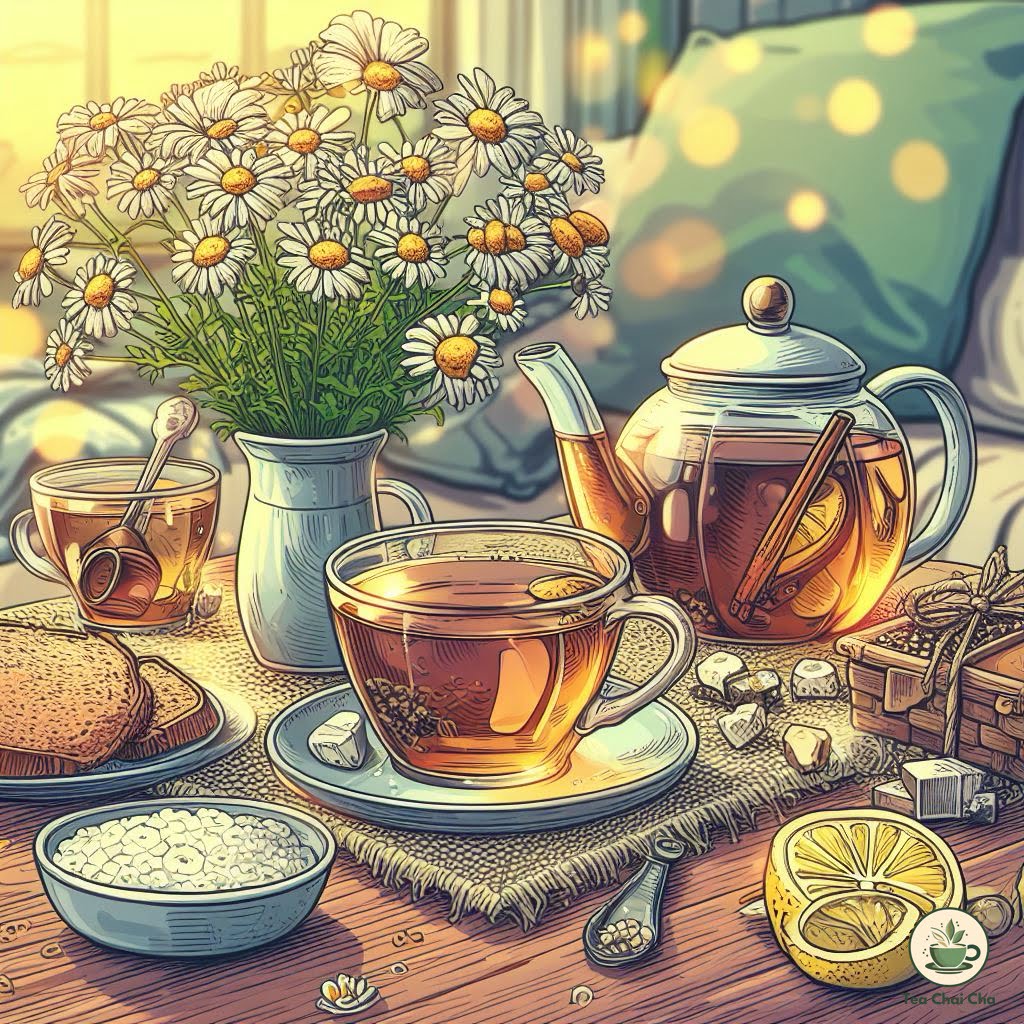
Chamomile Tea Variations
If you’re looking to explore beyond the classic cup of chamomile tea, you’re in for a treat.
Let me share these simple yet satisfying options that can add a touch of variety to your chamomile experience.
Iced Chamomile Lemonade
For a revitalizing twist on chamomile tea, try making iced chamomile lemonade.
Brew a strong cup of chamomile tea, let it cool, and then mix it with freshly squeezed lemon juice.
Add a bit of sweetener if desired.
The result is a lightly tangy drink that’s perfect for warm days.
Chamomile and Mint Cooler
Combine the calming properties of chamomile with the refreshing taste of mint.
Brew chamomile tea and let it chill.
Then, muddle a few fresh mint leaves in the bottom of a glass, add ice, and pour in the chilled chamomile tea.
It’s a soothing blend that’s ideal for relaxation.
Chamomile Green Tea Fusion
Mixing chamomile with green tea is a great way to balance the floral notes of chamomile with the earthy flavors of green tea.
Brew both teas separately, and then combine them in equal parts.
You’ll get a harmonious fusion that’s both calming and refreshing.
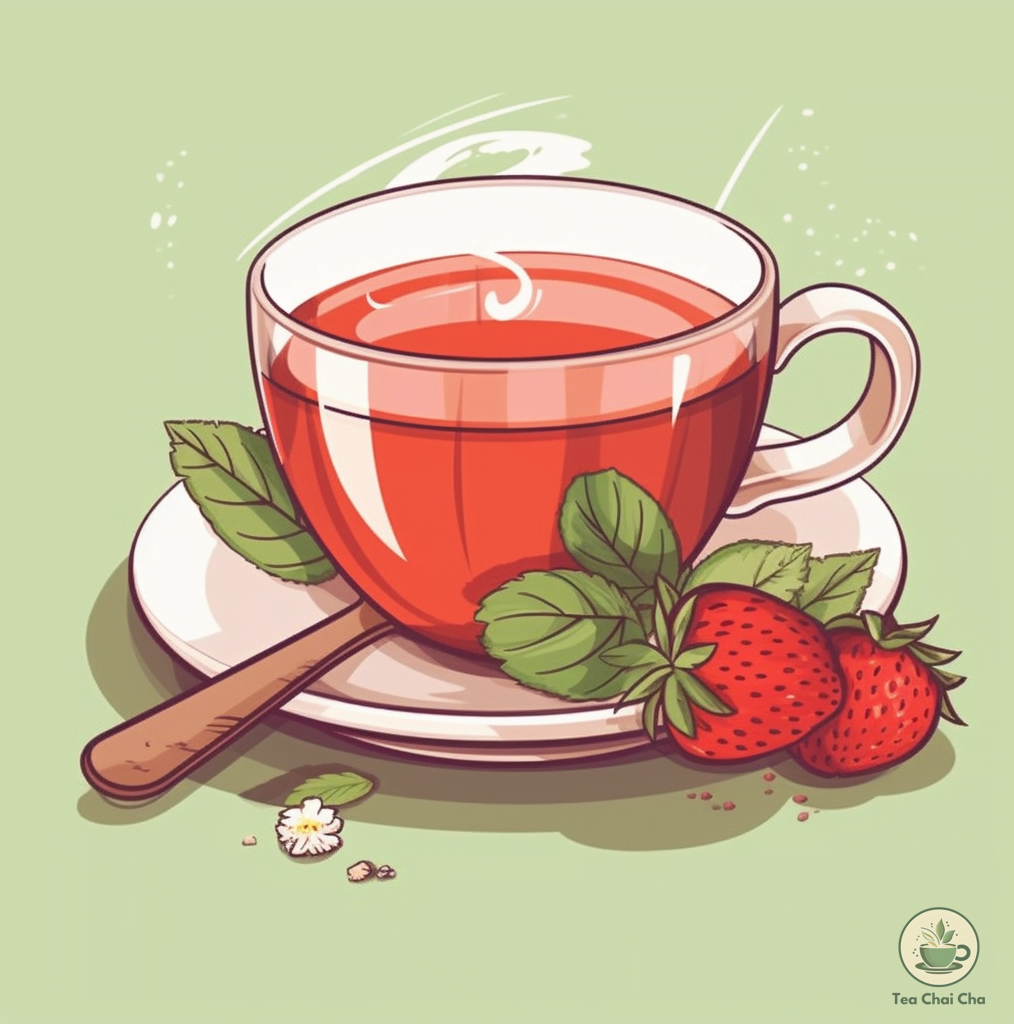
Chamomile Latte
For a cozy chamomile-infused latte, brew a strong cup of chamomile tea and froth your milk of choice.
Mix the brewed chamomile tea with the frothed milk, and optionally add a touch of vanilla syrup or honey for sweetness.
It’s a comforting drink that’s perfect for a relaxing evening.
Chamomile and Berry Iced Tea
Combine the subtle sweetness of chamomile with the vibrant flavors of berries.
Brew chamomile tea and let it cool.
Then, add a handful of your favorite berries (strawberries, blueberries, raspberries) to a glass, muddle them slightly, and pour in the chilled chamomile tea.
The result is a visually appealing and refreshing drink.
Chamomile and Ginger Tea
Infuse your chamomile tea with a hint of warmth by adding freshly grated ginger.
Brew chamomile tea and let it steep with a few slices of ginger.
This concoction is both soothing for the stomach and refreshing for the senses.
Chamomile Coconut Iced Tea
Blend the calming charm of chamomile with the tropical touch of coconut.
Brew chamomile tea, let it cool, and then mix it with coconut water or coconut milk.
The combination is not only soothing but also transports you to a mini-vacation in a glass.
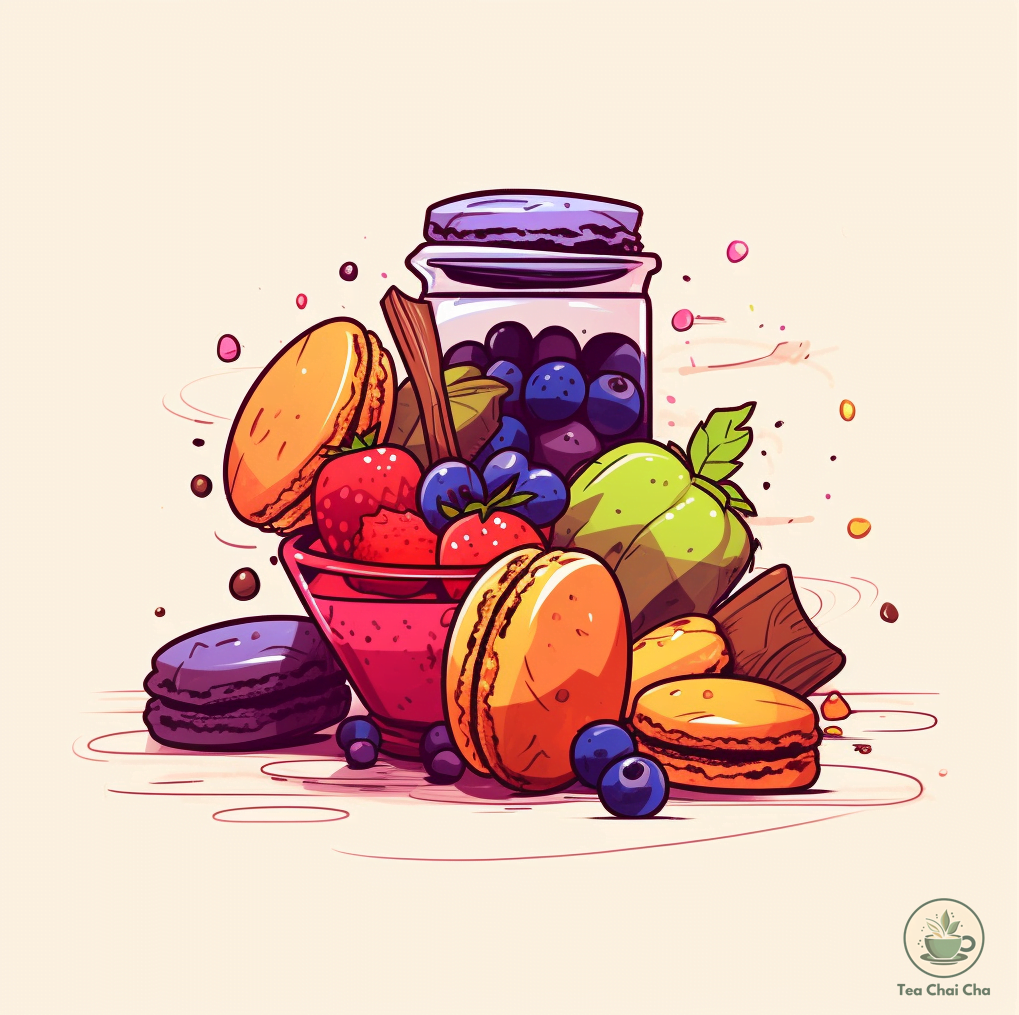
Chamomile Tea Food Pairing
Wondering what to eat with a soothing cup of chamomile tea?
There’s a world of delectable options to pair it with, enhancing your relaxation and pleasure.
Here are a few pairings I love as they add a touch of deliciousness to my tea moments.
Honey and Biscuits
One of my all-time favorite companions for chamomile tea is a drizzle of honey and a couple of buttery biscuits.
The natural sweetness of honey harmonizes perfectly with the mild, floral notes of chamomile.
Pair this with your favorite biscuits – whether they’re classic shortbread or wholesome whole wheat – for a comforting and indulgent combination.
Lemon Zest Cake
If you’re seeking a slightly tangy contrast to the tea’s gentle flavors, a slice of lemon zest cake is an excellent choice.
The zesty, citrusy flavors of the cake provide a refreshing balance to the chamomile’s subtle taste.
This pairing is especially delightful during afternoon tea sessions.
Almond Biscotti
For a hint of nuttiness that complements chamomile’s natural earthiness, try dipping almond biscotti into your tea.
The crunch of the biscotti against the smoothness of the tea creates a satisfying textural experience.
The nutty undertones of almond also add depth to the overall flavor profile.

Fresh Fruit Salad
If you prefer a healthier option, a bowl of fresh fruit salad alongside your chamomile tea is a wonderful choice.
The juicy, vibrant fruits cleanse your palate between sips, making each taste of tea feel refreshing.
Opt for fruits like apple slices, berries, or even a wedge of juicy watermelon.
Vanilla Shortbread Cookies
Vanilla and chamomile make for a dreamy combination that’s hard to resist.
A couple of vanilla-infused shortbread cookies enrich the tea’s aroma and provide a mild sweetness.
The comforting flavors will have you reaching for more.
Dark Chocolate
Surprisingly, dark chocolate can pair beautifully with chamomile tea.
The bitterness of dark chocolate contrasts with the tea’s floral notes, resulting in a sophisticated combination.
Break off a piece of dark chocolate and let it melt slightly in your mouth before taking a sip of tea for a luxurious treat.

When to Drink Chamomile Tea
Known for its mild floral taste and relaxation-inducing effects, chamomile tea has been a go-to choice for many looking to unwind after a long day or find comfort in a cup.
Here’s when you can sip on this brew:
Before Bedtime
Chamomile tea’s tranquil properties make it an ideal choice for winding down before bed.
The soothing warmth of the tea and its mild sedative effects can help relax your mind and body, making it easier to transition into a peaceful sleep.
I’ve personally found that sipping a cup of chamomile tea about an hour before bedtime can significantly improve the quality of my sleep.
Stressful Moments
When stress and anxiety start to creep in, a cup of chamomile tea can serve as a comforting companion.
Whether it’s a hectic workday or a particularly overwhelming moment, preparing and enjoying a cup of chamomile tea can provide a mindful pause.
The natural compounds in chamomile, like apigenin, have been shown to have calming effects, helping to soothe frazzled nerves.
Digestive Relief
Chamomile tea has a long-standing reputation for aiding digestion.
If you find yourself dealing with indigestion, bloating, or an upset stomach, chamomile tea might be just what you need.
The anti-inflammatory properties of chamomile can help alleviate discomfort.
And the warm liquid itself can have a soothing effect on your digestive system.
After Meals
Consider enjoying a cup of chamomile tea after a meal.
Not only can it help with digestion, but it can also serve as a pleasant conclusion to your dining experience.
The gentle flavors of chamomile can provide a subtle contrast to the flavors of your meal, rounding out the overall culinary experience.
Quiet Moments
Sometimes, it’s important to take a break and enjoy a moment of tranquility.
Whether you’re reading a book, meditating, or simply gazing out the window, a cup of chamomile tea can enhance these serene moments.
Its aroma and taste can create a sense of calm, allowing you to fully embrace the stillness of the present.
Related to Tea Making

Chamomile Tea Recipe
Recipe by Tania FaysalCourse: DrinksCuisine: European, Mediterranean1
servings5
minutes5
minutes5
kcal10
minutesHere's an easy-to-make chamomile tea recipe that you can follow to sip on a sweet cup of chamomile tea.
Ingredients
1 to 2 teaspoons of dried chamomile flowers (or 1 chamomile tea bag)
1 cup of hot water
Optional: Honey or lemon slices for added flavor
Directions
- Boil your water. You can do this on the stove or use an electric kettle. Just make sure it's nice and hot.
- While the water is heating up, put your chamomile flowers or tea bag into your cup or mug. If you're using loose flowers, a tea infuser or strainer can help keep bits out of your tea.
- Once the water is boiling, pour it over the chamomile flowers or tea bag in your cup.
- Let it steep. Cover your cup with a saucer or a small plate to keep the heat in, and let the chamomile steep for about 5 minutes. If you like it stronger, you can let it steep a bit longer.
- Remove the chamomile flowers or tea bag, and your tea is ready. If you like, you can add a bit of honey or a slice of lemon for extra flavor.
Recipe Video
Notes
- Steeping time can vary based on your taste. Some prefer a milder flavor, so they steep for 3-4 minutes, while others like it stronger and steep for up to 10 minutes.
- If you're using fresh chamomile flowers from your garden, you can use a handful of them instead of dried flowers or a tea bag.
- Experiment with honey or lemon to find your perfect balance of sweetness and tartness.
Frequently Asked Questions (FAQs)
What does chamomile tea taste like?
Chamomile tea has a mild and soothing taste with floral and slightly earthy notes.
It’s often described as having a pleasant and delicate flavor, making it a comforting choice for those seeking a gentle and calming beverage.
Does chamomile tea have caffeine?
No, chamomile tea is naturally caffeine-free. This makes it a great option for people who want to enjoy a warm and soothing drink without the stimulating effects of caffeine. It can be consumed at any time of the day, including evenings.
Is chamomile tea a real tea?
Technically, chamomile tea is not a true tea because it is not made from the leaves of the Camellia sinensis plant, which is used to make traditional teas like green tea, black tea, and oolong tea.
Chamomile tea is an herbal infusion made from the dried flowers of the chamomile plant.
How many calories are in chamomile tea?
Chamomile tea is very low in calories. Typically, an 8-ounce (240 ml) cup of chamomile tea contains around 2-5 calories, depending on the specific preparation method and any added ingredients.
How to make chamomile tea for weight loss?
Chamomile tea itself doesn’t have direct weight loss properties, but it can be a part of a healthy routine.
To make chamomile tea for weight loss, brew it using dried chamomile flowers and hot water. It’s better to enjoy it plain to avoid calories.
How to make chamomile tea for sleep?
Use any method above I shared to make chamomile tea for sleep. It doesn’t have caffeine and it won’t disturb your sleep.
How to make chamomile tea from plant?
If you have chamomile in your garden, you can either make fresh flower chamomile tea or dry the flower (with petals and dome) and then brew tea using my recipe.
